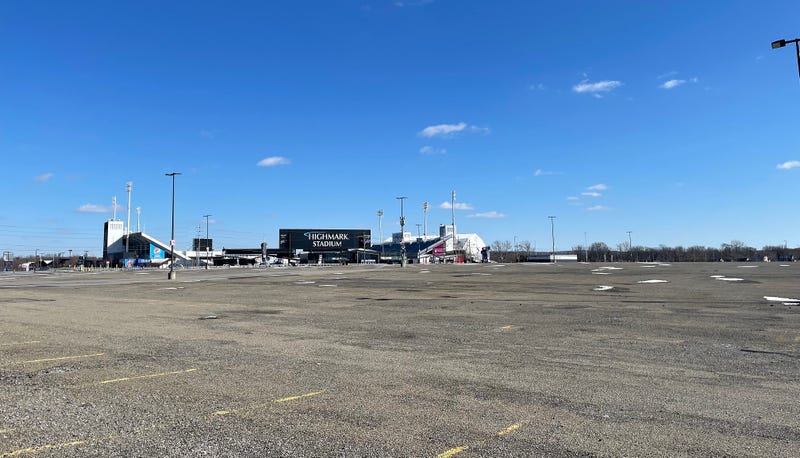
Buffalo, N.Y. (WBEN) - Erie County Legislators gathered on Thursday at Erie County and City Hall for a number of committee meetings taking place in Downtown Buffalo.

It was also the first time Legislators convened since the announcement of a new stadium deal for the Buffalo Bills, which officially took place on Monday.
The deal agreed upon by the Bills, Erie County, New York State and the National Football League includes a 30-year commitment for the Bills to remain in Buffalo, and a combined $550 million from the NFL and Bills, which was approved Monday by NFL owners. New York Gov. Kathy Hochul will advance a $600 million proposal in the state budget, with Erie County contributing $250 million. That total share of publicly financing adds up to 60.7% of the funding required to build the stadium.
However, the public's share of the cost of building and operating a new stadium for the Buffalo Bills will reportedly exceed $1.1 billion, once long-term maintenance costs are factored in.
Despite some details that will need to be glossed over and finalized before shovels go into the ground, the deal agreed upon will ensure the long-term future of the Bills in Western New York.
"What I'm hearing, and a little bit that I do know, is that we got a deal done with the Bills and a new stadium. I think that was the most important piece," said Legislator Howard Johnson. "Next is the groundwork and everything else that comes after that, but the most important pieces is that we got to deal with done and the Bills will remain here in Western New York."
Although the Memorandum of Understanding (MOU) was released by both the Hochul Administration and Erie County Executive Mark Poloncarz on Wednesday, there was not much time for Legislators to get a detailed look at the agreement in place. But upon first glance at the MOU, Legislators tend to like what they see.
"At first blush, the lease deal looks like a very fair deal for Erie County taxpayers, as long as the numbers hold up, and as long as there's no tax increase," said Legislator Joe Lorigo. "One of the things that I want to discuss with my Legislative colleagues is putting more of our surplus money down on that $250 million and borrowing less, so that the debt service burden on taxpayers is reduced for the next 20-30 years."
One part of the new stadium deal that Legislators seem to be in favor of is it allows Erie County to get out of the football business once the building is constructed across the street on Abbott Road from Highmark Stadium.
"I think that the proposal that is coming before us definitely relieves Erie County taxpayers of the burdens that are associated with the upkeep of a stadium. That includes everything from lawsuits to game day expenses, maintenance and capital improvements," said Legislator April Baskin. "I'm glad that we were one, able to keep our beloved Bills local, but two, be able to transfer a lot of the financial responsibilities over to the State, which should free up some funding in Erie County for us to address other priorities that the residents and taxpayers want us to address."
"We don't have any ongoing costs, which is great for us. No more maintaining the stadium, we don't have to pay hundreds of thousands of dollars to repair the upper deck now. So I think that's good for us," Legislator John Gilmour added. "Also, it secures the Bills in Buffalo for the next 30 years. I mean, I think that's a big deal. Everything can't be about money. I think it's important for our city that the Bills continue to be here, especially since they're playing so well. I'd hate to see him leave. They're a big part of Buffalo, and I think if they were to leave, it would be very hurtful to our city."
While the stadium deal will likely be the topic of discussion in the Legislature for some, there is no rush to get all the necessary paperwork finalized and signed off by the Legislature. The hope is to have all the legal paperwork filed and completed by Sept. 1, which will then further the motion to begin construction efforts on the new stadium.
"We know we have to go through it and look through its entirety to see what's there, but it's there," Legislator Johnson said. "Just on a general microscopic level right now, it's a good piece of work that's already been done."
So what are some of the concerns with this stadium deal that Legislators are potentially looking to address or get more questions about?
Here is some of what the Legislators had to say:
Non-Relocation Agreement legal remedies:
Legislator Gilmour: "We've had some questions about that too. We haven't got those answers yet. I did see that. It looks like they're locked in place for, at least, the first 15 years, but then it certainly declines afterwards. I don't know what 'substantial' means. Is that half, more than half? I understand that after there's a 15-year investment, if a court was to allow them to leave, they would still pay a penalty to us, but what is that? We don't know."
Legislator Lorigo: "I think it's less of a huge concern, more of a minor concern, because I think there are deterrence in the lease in the Memorandum of Understanding that would keep them here. Now, of course, that can change once the final details come out and once we have an opportunity to review them. I haven't been privy to that, there are no documents yet. Once those do come out in the next several months, we'll take a look and go from there."
Having enough union workers for the construction of the stadium:
Legislator John Mills: "I'm concerned whether or not we have enough manpower through the union structure to fill the gaps with construction. I don't want to see union people coming in from Ohio or Pennsylvania and taking jobs away from local contractors. That's got to be worked out."
Legislator Lorigo: "In our conversations with the County Executive, he admitted that we'd simply don't have the union labor in Western New York to accommodate the type of work that needs to be done. They're already looking at New York City and other states to get those workers here. I think we should focus on union and non-union workers in Western New York to get that work done before we start looking at New York City, Pennsylvania or Canada or other states."
An effective community benefits agreement (CBA):
Legislator Mills: "One of my concerns is with Town of Orchard Park, what are we going to do to help the residents around the stadium? It's going to be another massive impact on their lives, and they've got something that has to be addressed like sidewalks and things like that. Just buffer zones for the residents in that part of the Town of Orchard Park. It's very important we do that, and work with the town so they can develop their own economic format and how they want to develop the town."
Legislator Baskin: "It's imperative, and I don't think that we can have a good stadium deal absent of it. So I'd like to commend the County Executive, Gov. Hochul, Pegula Sports and Entertainment, and the NFL for prioritizing that request in the MOU. I think it was identified multiple times in the MOU. It was definitely spelled out that it should benefit communities, especially communities that are underserved, and I was excited to see that language there."
New economic development around the new stadium:
Legislator Gilmour: "Realistically, this data has been out there already for how many years? What's out there is out there. We're hoping that since the stadium is going to be for more of a mixed use, maybe drop some soccer and some other events, that it'll spur some development. But, again, I don't know if that'll happen. I guess time will tell."
Legislator Mills: "I think that's why the County has to address the issue with the Town of Orchard Park, so that we can jointly develop that area of the town and make it more inclusive for business, and certainly the residents that live there. I think that's very important. This is a big deal."

